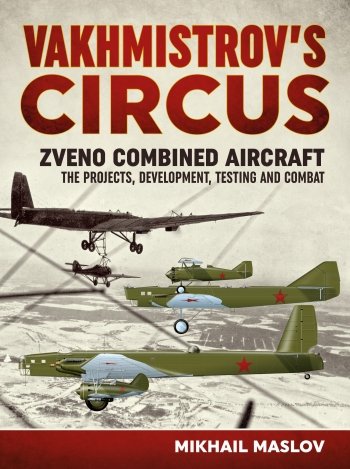-
Załączniki bezpieczeństwa
Załczniki do produktuZałączniki dotyczące bezpieczeństwa produktu zawierają informacje o opakowaniu produktu i mogą dostarczać kluczowych informacji dotyczących bezpieczeństwa konkretnego produktu
-
Informacje o producencie
Informacje o producencieInformacje dotyczące produktu obejmują adres i powiązane dane producenta produktu.HELION
-
Osoba odpowiedzialna w UE
Osoba odpowiedzialna w UEPodmiot gospodarczy z siedzibą w UE zapewniający zgodność produktu z wymaganymi przepisami.
The purpose of this publication is to provide readers with most complete history of combined aircraft designs created by Vladimir Vakhmistrov. The designer himself referred to his projects as ‘Zveno Aircraft’ (where the Russian word ‘Zveno’ stands for ‘Chain link’ or ‘Flight’ combat unit), adding the names of aircraft which were included in each configuration. Vakhmistrov was among the world’s pioneers in devising and implementing the attachment of small fighters under heavy bombers. The larger aircraft were thus able to carry the smaller ones to the target area, whereas the fighters, in their turn, after the separation from their ‘motherships’, acted as guards for the slow-speed giants. During the period from 1931 thru 1941, several configurations of this concept were created involving mass-produced TB-1 and TB-3 bombers, and I-4, I-5, I-Zet, and I-16 fighters, which were modified correspondingly in order to fit the task. Basing on Vakhmistrov's projects there were carried out the first in the world air connections of fighters under their bomber carriers. The most successful variant among all the created Zveno aircraft consisted of a four-engined Tupolev TB-3 bomber and two Polikarpov I-16 fighters attached under the bomber’s wing. The fighters carried two 250-kg bombs each and acted as a high-speed dive bombers after disconnection from the carrier plane. Several such aircraft, referred to as Zveno-SPB, were used operationally during the war by the Black Sea Fleet Air Force. Initially, three TB-3s with AM-34RN engines were allocated for re-equipment into Zveno-SPB which were taken into service by the 2nd Special Squadron of the 32nd Fighter Regiment, 62nd Aviation Brigade of the Black Sea Fleet Air Force stationed in Eupatoria. The order to begin combat application of the 32nd Regiment's combined aircraft was given on 22 July 1941, while the first air raid on port structures in Romania, the German ally, was made on 26 July. More than thirty combat missions were carried out till October 1941, and became one of the most successful operations of the Soviet aviation during the Great Patriotic War. Meanwhile, Vakhmistrov had a large number of other interesting projects and many of them remained on the designer's drawing board. More than 20 years were spent by the author on the historical research of the subject in the Russian archives. The book is extensively illustrated by the pictures from the author's archive, aircraft test reports, as well as specially prepared scale drawings and color side views.








